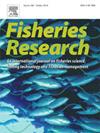关于估算捕捞努力量的自我报告数据的准确性——一个多价沿海渔业的案例研究
IF 2.3
2区 农林科学
Q2 FISHERIES
引用次数: 0
摘要
渔业活动的量化和分析是渔业科学和海洋管理的最重要特征之一,与渔业有关的数据一直是用于这一目的的主要资料来源。在不同类型的依赖渔业的数据中,自我报告的日志数据提供了大量关于渔业活动的不同信息。尽管它们非常重要,但令人惊讶的是,这些数据的质量和可靠性却没有得到充分的研究。然而,这类数据的准确性和一致性有时难以量化。为了研究航海日志数据如何成为渔业努力量量化的可靠来源,在这里,我们根据两种类型的渔业相关数据(1-航海日志数据和2-官方登陆数据)对葡萄牙大陆沿海多价船队的每艘船的捕捞努力量进行估计和比较。结果显示,两种数据类型的钓鱼总次数之间的差异为22.7 %。特别是,记录在航海日志数据上的船只的捕鱼次数明显低于官方登陆数据估计的次数。我们的研究结果支持了对日志数据准确性的担忧,特别是在估计捕捞努力量方面。就努力推断而言,我们建议从第三方记录和记录的数据(如官方登陆数据)中估计捕鱼努力量,是比自我报告数据更可靠的信息来源。本文章由计算机程序翻译,如有差异,请以英文原文为准。
On the accuracy of self-reported data for fishing effort estimates – A case study from a polyvalent coastal fishery
The quantification and the analysis of fishing activity is one the most important features in fisheries sciences and ocean management, and fishery-dependent data has always been the main source of information used to that end.
Within the different types of fishery-dependent data, self-reported logbook data provides vast amounts of different information about fishing activities. Despite their enormous importance, the quality and reliability of these data are surprisingly understudied. Yet, the accuracy and consistency of this type of data are sometimes difficult to quantify.
With the purpose of studying how logbook data can be a reliable source for fishing effort quantification, here we estimate and compare, for the Portuguese mainland coastal polyvalent fleet, the fishing effort of each vessel from two types of fishery-dependent data: 1- logbook data and 2- official landing data.
The results showed a difference of 22.7 % between the overall number of fishing trips from both data types. In particular, vessels had a significantly lower number of fishing trips logged on logbook data than the trips estimated from official landing data.
Our findings support the concerns regarding the accuracy of logbook data, especially for estimating fishing effort. As far as effort inference is concerned, we suggest that the estimation of fishing effort from data logged and recorded from a third party, like official landing data, is a more reliable source of information than self-reported data.
求助全文
通过发布文献求助,成功后即可免费获取论文全文。
去求助
来源期刊

Fisheries Research
农林科学-渔业
CiteScore
4.50
自引率
16.70%
发文量
294
审稿时长
15 weeks
期刊介绍:
This journal provides an international forum for the publication of papers in the areas of fisheries science, fishing technology, fisheries management and relevant socio-economics. The scope covers fisheries in salt, brackish and freshwater systems, and all aspects of associated ecology, environmental aspects of fisheries, and economics. Both theoretical and practical papers are acceptable, including laboratory and field experimental studies relevant to fisheries. Papers on the conservation of exploitable living resources are welcome. Review and Viewpoint articles are also published. As the specified areas inevitably impinge on and interrelate with each other, the approach of the journal is multidisciplinary, and authors are encouraged to emphasise the relevance of their own work to that of other disciplines. The journal is intended for fisheries scientists, biological oceanographers, gear technologists, economists, managers, administrators, policy makers and legislators.
 求助内容:
求助内容: 应助结果提醒方式:
应助结果提醒方式:


